Heart Disease in Dogs and CatsHeart Supplements For DogsWhat Is Heart Disease in Dogs?Dogs can have a variety of heart conditions. Being proactive is essential, as warning signs of heart disease may not appear until the disease has progressed to an advanced state. Common heart disease problems may include heart murmurs, congestive heart failure, high blood pressure, hypertrophic cardiomyopathy (HCM) or poor valve function. While some breeds may be predisposed to develop congenital heart conditions, pets often develop heart problems with age. Early diagnosis, working closely with your veterinarian and using a heart-healthy diet and supplement regimen can help your pet live a longer and healthier life. Why Use Heart Health Supplements For Dogs?Supplements for heart disease in dogs are often used as part of a comprehensive treatment plan to support cardiovascular health and manage symptoms. Here are some reasons why veterinarians often recommend them: 1) Supporting Heart Function: Some heart health supplements like CoQ10 for dogs with heart disease can support heart muscle function and improve circulation. 2) Reducing Inflammation: Omega-3 fatty acids, in particular, have anti-inflammatory properties that can help reduce inflammation in the cardiovascular system, which is beneficial for dogs with heart disease. 3) Managing Symptoms: Supplements can help manage symptoms associated with heart disease, such as fatigue, coughing, and difficulty breathing. Ingredients like omega-3 fatty acids found in fish oil or Coenzyme Q10 may help improve exercise tolerance and reduce coughing. 4) Antioxidant Protection: Some supplements contain antioxidants like resveratrol, vitamin E and selenium, which can help protect the heart tissue from damage caused by free radicals. 5) Improving Quality of Life: By supporting overall heart health and managing symptoms, supplements can contribute to improving the quality of life for dogs with heart disease, allowing them to lead more comfortable and active lives. Natural remedies for dogs with heart disease work best when used in conjunction with treatments prescribed by your veterinarian. Below, you’ll find the best supplements for dogs with heart murmurs, congestive failure, DCM and heart disease. 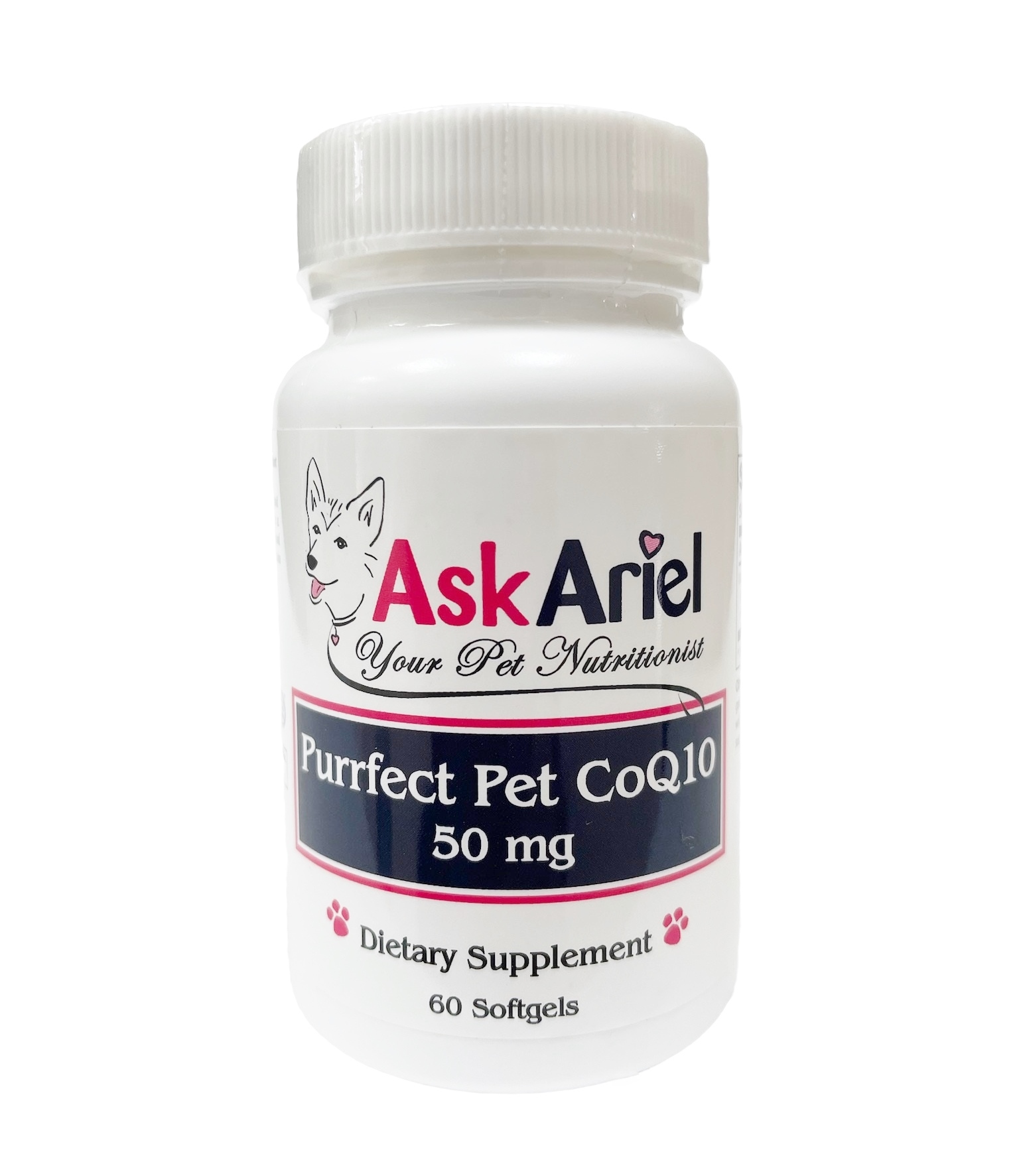 Purrfect Pet CoQ10 - Supports circulation, cardiovascular and heart health. Purrfect Pet CoQ10 is made with genuine Kaneka Ubiquinol - the reduced, active antioxidant form of coenzyme Q10 - for maximum benefit and highest absorption. It is pure, safe & natural. Made in the USA. Gluten-free, non-GMO & hypoallergenic. CoQ10 helps to reduce oxidative damage & inflammation in the lungs. Purrfect Pet CoQ10 can support your pet on a cellular level, by helping to facilitate enzyme activity & energy production. As your pets age, they lose CoQ10 and the ability to convert it. Purrfect Pet CoQ10 can resupply your pet with this vital antioxidant and may slow the progression of heart disease. Purrfect Pet CoQ10 is a dog heart murmur natural treatment that is frequently recommended by veterinarians. 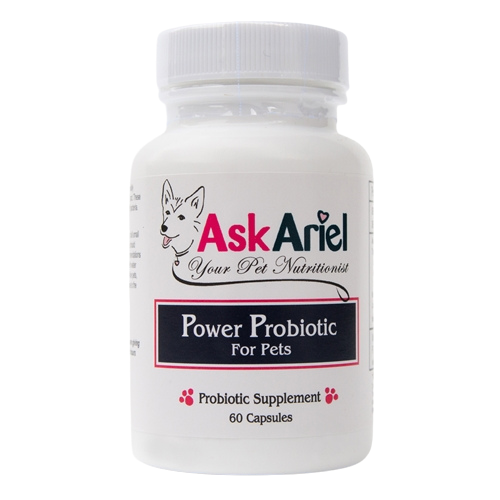 Power Probiotic - Power Probiotic is the best probiotic for pets! Backed by scientific research, this powerful, multi-strain formula repopulates the good, friendly bacteria, which research suggests may reduce blood pressure and inflammation, supporting a healthy heart. It’s pure, safe and natural with no fillers! Many pets love the taste of Power Probiotic! 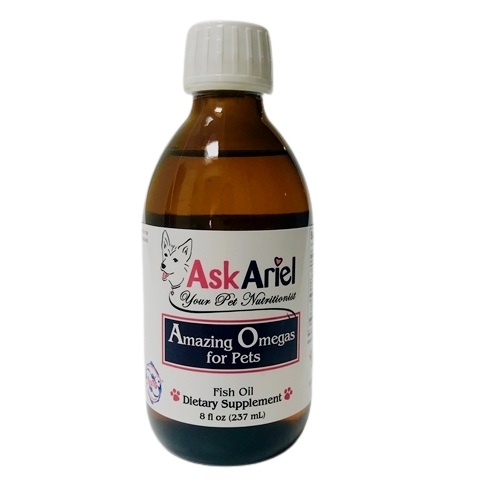 Amazing Omegas For Pets - This product contains a research-backed, powerful source of omega-3 fatty acids, which have been scientifically shown to benefit dogs and cats with heart disease. It’s packed in glass bottles to maintain freshness and to prevent toxins from plastic from leaking into the oil. It’s third-party tested for purity and to ensure all heavy metals and environmental toxins have been eliminated. It’s gently manufactured to supply the omega-3 fatty acids the way nature provided them for an enhanced benefit to your pet. Amazing Omegas are made with a lemon scent and some finicky pets may not like the taste. Consider PureOcean Wild Omegas instead. Amazing Omegas For Pets - This product contains a research-backed, powerful source of omega-3 fatty acids, which have been scientifically shown to benefit dogs and cats with heart disease. It’s packed in glass bottles to maintain freshness and to prevent toxins from plastic from leaking into the oil. It’s third-party tested for purity and to ensure all heavy metals and environmental toxins have been eliminated. It’s gently manufactured to supply the omega-3 fatty acids the way nature provided them for an enhanced benefit to your pet. Amazing Omegas are made with a lemon scent and some finicky pets may not like the taste. Consider PureOcean Wild Omegas instead.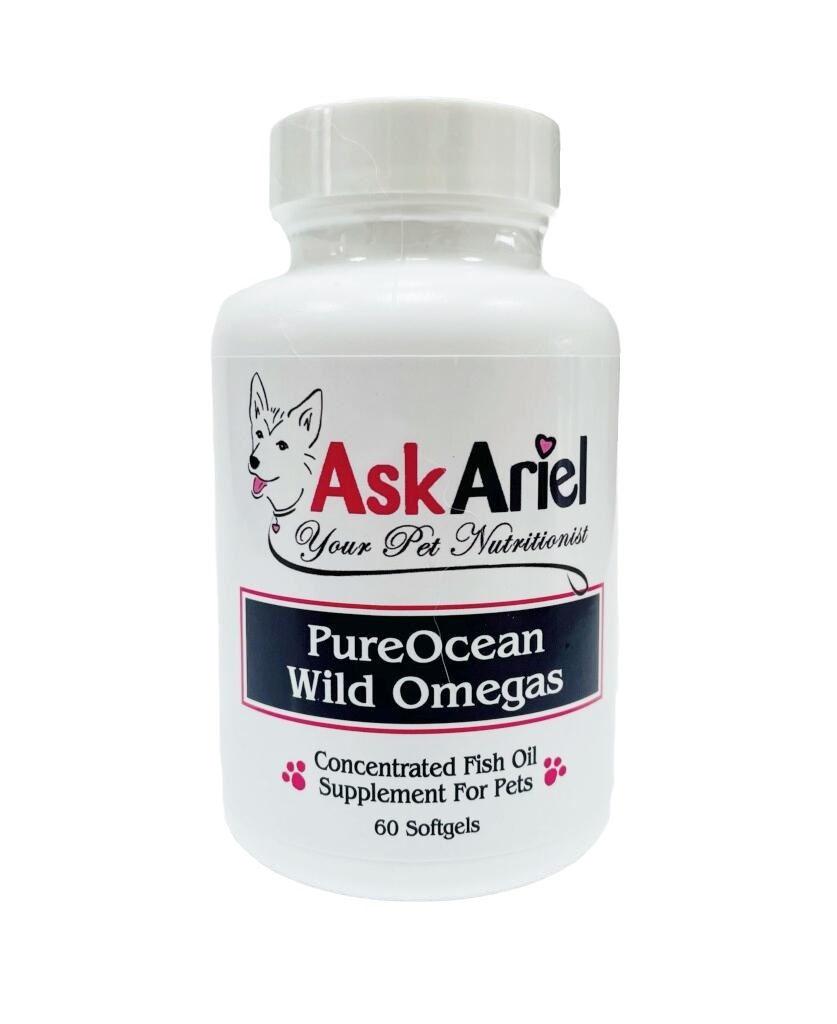 PureOcean Wild Omegas - PureOcean Wild Omegas are concentrated, easy-to-use softgels. They have a natural fishy flavor and many pets love the taste. Fish oil is rich in omega-3 fatty acids, particularly eicosapentaenoic acid (EPA) and docosahexaenoic acid (DHA). They help reduce inflammation in the heart and cardiovascular system, support heart function by helping to regulate heart rhythm, and may help lower blood pressure in pets with hypertension (high blood pressure). PureOcean Wild Omegas may help reduce symptoms such as coughing, difficulty breathing, and low energy levels. 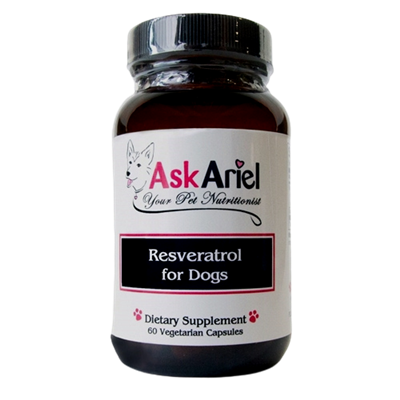 Resveratrol For Dogs - This product contains an exceptional antioxidant that has been researched for its cardiovascular support and cancer-fighting properties. Scientific research shows that its anti-inflammatory effect in the vascular system leads to a reduced risk of inflammation and blood clotting, common precursors to heart disease. It’s a very concentrated formula and works best for dogs over 10 pounds. .png) Happy Paws Organic Hemp Extract For Dogs - Hemp extract is a natural way to help manage heart disease in dogs and cats. Happy Paws Hemp Extract can help by decreasing inflammation and calming anxiety. Hemp extract is being researched for its anti-inflammatory and antioxidant properties that may help reduce heart disease risk factors such as high blood pressure. Heart disease is associated with inflammation and studies show that hemp extract may help to increase vasodilation to improve blood flow. Happy Paws is the best hemp extract for heart disease in pets. It contains simple ingredients: organic hemp extract and coconut oil. It’s rigorously tested for potency and purity. Each 1oz bottle contains 550mg of full spectrum hemp extract in an unflavored all-natural coconut oil base. 100% organic. Made in the USA. Happy Paws Organic Hemp Extract For Dogs - Hemp extract is a natural way to help manage heart disease in dogs and cats. Happy Paws Hemp Extract can help by decreasing inflammation and calming anxiety. Hemp extract is being researched for its anti-inflammatory and antioxidant properties that may help reduce heart disease risk factors such as high blood pressure. Heart disease is associated with inflammation and studies show that hemp extract may help to increase vasodilation to improve blood flow. Happy Paws is the best hemp extract for heart disease in pets. It contains simple ingredients: organic hemp extract and coconut oil. It’s rigorously tested for potency and purity. Each 1oz bottle contains 550mg of full spectrum hemp extract in an unflavored all-natural coconut oil base. 100% organic. Made in the USA.
Puff Daddy
"We had some good news about Puff Daddy! Ever since Puff Daddy was a pup, different vets would say they heard a mild heart murmur. About two years ago, we started a heart disease protocol that included Amazing Omegas, Purrfect Pet CoQ10, and Resveratrol For Dogs. We went in for Puff Daddy’s rabies vaccination and the vet listened to his heart for quite some time. She looked up amazed. She heard no murmur. She asked me what I was giving him and said to keep it up. Puff Daddy has the energy of a puppy, running at full-speed with dogs 3-4x his size. I am so grateful for Ask Ariel." - Andrea, Washington D.C. 
What is a heart murmur? A heart murmur is an abnormal heart sound. There are several different types of heart murmurs. The most common is a systolic murmur. These are usually caused by narrowing blood vessels in the heart but can also be caused by anemia, cardiomyopathy or hyperthyroidism. Diastolic heart murmurs are caused by leaks in the aortic valves and are quite rare in pets. Some murmurs are innocent or physiologic, which means that they are harmless sounds as the blood circulates through the heart. A pathologic heart murmur can be caused by disease or a structural defect in the heart. An irregular heartbeat, persistent coughing, and a lack of energy are classic signs of a heart murmur in dogs and cats.
Heart murmurs are graded by their intensity based on a scale of I to VI. A very slight, faint murmur will be a Grade I murmur. As they intensify, the scale increases. A loud murmur that can be felt is generally a Grade VI murmur. Heart murmurs can be serious, but in most cases, they are treatable. Cat and dog heart murmur coughing treatment is dependent on the diagnosis of the underlying condition. If the murmur is caused by something like anemia or hyperthyroidism, the treatment plan will be much different than that for a cat or dog with congestive heart failure. Pets with heart murmurs need to be regularly monitored by a vet, as murmurs can be a sign of heart disease. Cat or dog heart murmur natural treatment includes exercising regularly, maintaining a healthy weight and adding heart supplements containing omega-3 fatty acids and antioxidants to keep your pet's heart function strong.  C.jpeg)
Bella
"I love the new CoQ10 formula for our dog, Bella. These capsules are easy to handle and administer. The outside is firmer, yet squeezable, making it easier to divide than other CoQ10 options. Thank you for providing this supplement to support Bella’s heart health. Even with a Grade IV heart murmur at age 15, she is happy, healthy, and active." - Brenda, California
Does your dog or cat have a persistent cough? Does it appear to have a hard time breathing? Most would consider this to be a respiratory issue, but these are the most common symptoms of congestive heart failure (CHF). CHF is a progressive disease where the heart struggles to pump blood efficiently, leading to fluid buildup in the lungs or abdomen. Fluid accumulation on the left side of the heart leads to edema in the abdomen, while fluid accumulation on the right side produces coughing and lung congestion. CHF affects both cats and dogs and usually develops in middle-aged and senior pets. It is often harder to detect heart problems in cats than in dogs because the symptoms may not be as noticeable until the cat’s heart disease has progressed significantly.
Some common conditions linked to congestive heart failure in cats and dogs may include:
High blood pressure, or hypertension, is a common precursor to heart disease and CHF in cats and dogs. Blood pressure is the pressure of circulating blood against the walls of blood vessels. High blood pressure can cause restricted blood flow in the arteries, making the heart muscle work harder. Over time, the increased pumping and pressure can lead to deterioration and weakness of the heart muscle.
Most cats and dogs with high blood pressure have secondary hypertension - meaning it is caused by another disease or condition. Primary hypertension - high blood pressure on its own - is very rare in pets. The most common conditions causing high blood pressure in cats and dogs include kidney disease, diabetes, hyperthyroidism and Cushing's disease (hyperadrenocorticism). With appropriate treatment for these diseases, pets may have their blood pressure decrease back into the normal range. High blood pressure can be associated with many symptoms and health issues, so it is important to have your dog or cat checked by their veterinarian. The risk of high blood pressure increases as your cat or dog ages. With age, they also become more susceptible to kidney disease and heart conditions. Make a blood pressure check part of your pet's annual wellness exam.
Hypertrophic cardiomyopathy (HCM) is the most common heart disease diagnosed in cats. Maine coon, Ragdoll and Persian breeds are prone to this. HCM causes the muscular walls of a cat's heart to thicken, decreasing the heart's efficiency and sometimes creating symptoms in other parts of the body. A heart murmur or arrhythmia may be the first clinical sign, but not all cats with HCM have murmurs. Symptoms include rapid, open-mouthed breathing, lethargy and sudden hind limb paralysis. Some cats will show no symptoms. An echocardiogram, otherwise known as a cardiac ultrasound, affords a look at the inside of the heart and heart valves. This is the most important diagnostic test for HCM. Conventional veterinary treatment for hypertrophic cardiomyopathy consists of medications to regulate heart rate and beats, improve blood flow and alleviate fluid buildup. When dealing with hypertrophic cardiomyopathy in cats, treatment, including supportive care and medication, can allow some cats to live with HCM for years.
DCM or dilated cardiomyopathy in dogs is a condition that affects the heart muscle, leading to weakened contractions and decreased pumping ability. This weakening of the heart muscle can result in poor circulation and fluid buildup in the lungs and other parts of the body. Essentially, the heart becomes enlarged and loses its ability to function properly. DCM can affect dogs of any breed, but certain breeds are more prone to developing this condition. It is more common to see DCM in Doberman Pinschers, Boxers, Great Danes, Irish Wolfhounds, and Cocker Spaniels. While genetics play a significant role for a DCM dog, other factors such as diet and environmental factors may also contribute to its development.
Canine DCM symptoms can vary depending on the individual pet and the severity of the condition. Common signs of dilated cardiomyopathy in dogs include lethargy, decreased exercise tolerance, coughing, difficulty breathing, fainting, and abdominal distension due to fluid accumulation. If left untreated, DCM can progress rapidly and lead congestive heart failure. Veterinarians may recommend diagnostic tests such as echocardiography, electrocardiography, and chest X-rays to evaluate the heart's function and structure. Treatment options typically include medications to support heart function, diet changes, and natural supplements to support the heart. Symptoms of Heart Disease in Dogs and CatsThe clinical signs of congestive heart failure are quite varied, and many of them may not seem to be heart-related. Heart disease can be a “silent killer,” and it is important to have regular veterinary exams, as it can be caught early. Watching for these signs can improve the prognosis for your pet with heart disease and congestive heart failure.
Three Ways To Help Your Pet With Heart Disease
Monitor - If your pet is diagnosed with heart disease or congestive heart failure, close monitoring will be important to help your pet maintain an active and happy life. This will include regular veterinary visits to evaluate any changes in their condition and adjustment of medications. At home, a pet with heart disease will need to have much closer observation than a healthy pet. It will be important to monitor their exertion and resting heart rate. You will need to be vigilant and note any changes in your pet's behavior, appearance and appetite. Report any significant changes to your veterinarian.
Exercise - If your cat or dog has heart disease, keeping them at a healthy weight is extremely important. The more weight your pet is carrying, the harder your pet's heart has to work. Even though your pet has heart disease, regular mild to moderate exercise can be helpful to keep them healthy and fit. Be sure to take it slow and don't let them overexert themselves. Taking water and treats along during a walk, especially during the summer can really help. Intense exercise can aggravate the heart and lungs and can be dangerous for your pet. Diet - The best heart disease diet for dogs and cats is a diet high in fiber and rich in omega-3 fatty acids. A low-fat, fresh diet can be very beneficial. Green vegetables contain fiber, vitamins and minerals and can support a healthy immune system. Many pets are eating prescription diets that can contain chemicals, food allergens and grains when low-fat natural diets are available. Include your pet’s treats and diet on the order form at checkout, and we will include free heart diet tips on the packing slip that comes with your order.
Need Help?
We understand how hard it is when your pet is suffering from heart disease and we will do all we can to help. It can be confusing to know which cat and dog supplements would be appropriate for your pet. Please email us at [email protected]. Please note that we cannot provide consultative advice due to veterinary regulations, but we will be happy to provide articles and information so that you can make an informed decision about what's best for your pet. |